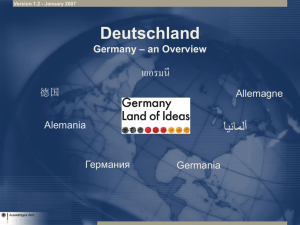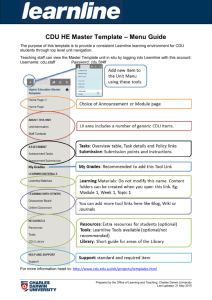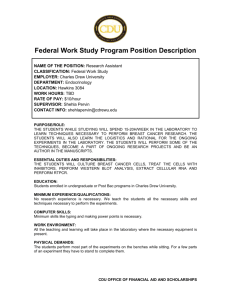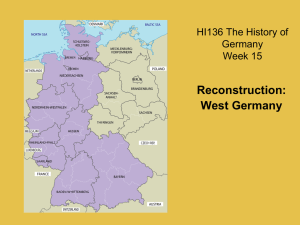Federal Republic of Germany
advertisement
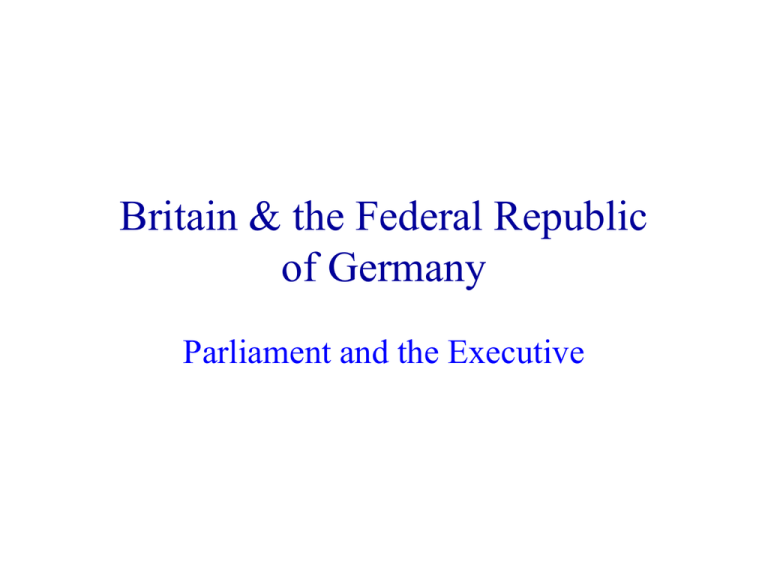
Britain & the Federal Republic of Germany Parliament and the Executive Political Science Seminar Series Enforcing NAFO Regulations: A European Union Perspective Michele Del Zompo Senior Coordinator of Control Operations with the (EU) Community Fisheries Control Agency 3:00 pm Friday, November 16th AA1045 Research papers: Due Friday, November 30th _____________ Final exam Saturday, Dec. 8th 9:00-11:00 AA1043 Party system: A moderate multiparty system: • 3-5 parties represented in the Bundestag • Parties disagree on extent of government intervention, as well as foreign policy, but • Substantial areas of agreement: – Commitment to social market economy, welfare state The Chancellor Constitutional position – strong: • Elected by the Bundestag (lower house) • Appoints the cabinet • Constitutionally charged with responsibility for overall government policy • Can only be removed through a positive vote of non-confidence (Bundestag must elect a replacement) Limits on the chancellor’s power • Basic law gives cabinet ministers constitutional responsibility for their own departments • Plus political limits… Political limits: • Multiparty politics • Coalition government: In order get power, a chancellor must share power – example current cabinet – a Grand Coalition of SPD &CDU • Need to pilot legislation through both the Bundestag (lower house) and the Bundesrat (Federal Council) in which laender (provincial governments) have a veto German Chancellors Relatively few occupants: • Konrad Adenauer – CDU (1949-63) • Ludwig Erhard – CDU (1963-66) • Kurt Kiesinger – CDU (1966-69) • Willie Brandt – SPD (1969-1974) • Helmut Schmidt – SPD (1974-82) • Helmut Kohl – CDU (1982-98) • Gerhard Schroeder – SPD (1998-2005) • Angela Merkel – CDU (2005-present) Chancellors and their power: Political position: • Typically: – leader of the largest party – Winner of the last election • Position within cabinet: – Unlike British PM, unable to shuffle at will – However, strong backing from the chancellery – like the Cabinet Secretariat, a strong central agency • Need to maintain political authority within his party and the country as a whole Stronger and weaker chancellors: Stronger: • Adenauer • Schmidt • Kohl Middling: • Kiesinger • Brandt • Schroeder Weaker: • Erhard To be determined: • Angela Merkel Gerhard Schroeder’s position (1998-2005) • Led a divided SPD • Narrowly based coalition: – SPD and Greens had a narrow 10 seat majority • Decreasing popularity – Impact of recent provincial elections • Uncertain international stature Comparing the British Prime Minister and the German Chancellor: • Which (if either) is most capable of acting without first securing the consent of others? Bases of British PM’s power • Written constitution? • Convention? • Politics & political support: – the ways in which parties transfer the power and authority of parliament to cabinet and prime minister Prime Minister’s advantage • Hires and fires the cabinet: acknowledged right to do so (a convention of the constitution) • Support of `10 Downing St.’ staff (Equivalent to Prime Minister’s Office, [PMO] in Canada) including policy unit, social inclusion unit… 10 Downing Street • Support from Cabinet Office: (Equivalent of Privy Council Office [PCO] in Canada) • Whip system The whip system and how it operates • Whip’s Office – Chief Whip – Deputy Whip – Assistant Whips • Serve as two way channel of communication: – Convey frontbench opinions to the back benches – Convey backbench views to the leadership • Make sure that the votes are there when they are needed The process of discipline: • A matter of conveying information and persuading • Punishment: removal of the whip or ostracism from the caucus – rarely applied • Dealing with dissent: – Canada: minimum or zero tolerance – UK: both parties tolerate some rebellion • Conservatives: – deep divisions over EU – Travails of Ian Duncan Smith (IDS) • New Labour: Iraq How Prime Ministers maintain support • The consensus strategy: enlist ministers representing different wings of the party. – – – – Harold Wilson (1964-70, 1974-76) James Callaghan (1976-79) Margaret Thatcher (from 1979-83) John Major (1990-1997) • Damn the torpedoes/shoot from the hip: – Margaret Thatcher (from 1983-90) – Tony Blair (1997-present) How different are Germany & Britain? • In both instances, parties matter: • Neither the German chancellor nor the British prime minister would be able to lead, or govern as they do, without disciplined or cohesive political parties • Even so, both are constrained & must retain political support Political Science Seminar Series Enforcing NAFO Regulations: A European Union Perspective Michele Del Zompo Senior Coordinator of Control Operations with the (EU) Community Fisheries Control Agency 3:00 pm Friday, November 16th AA1045
